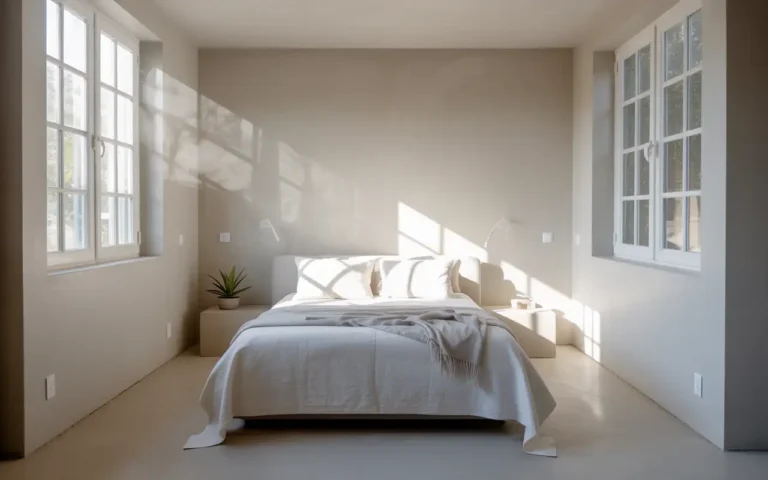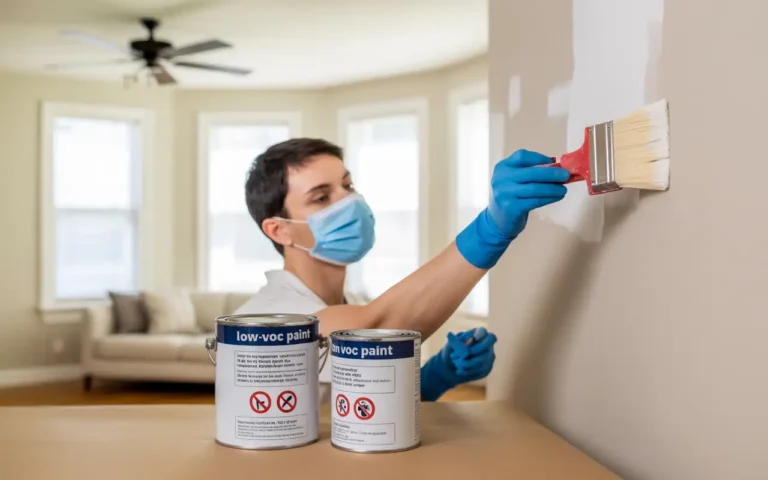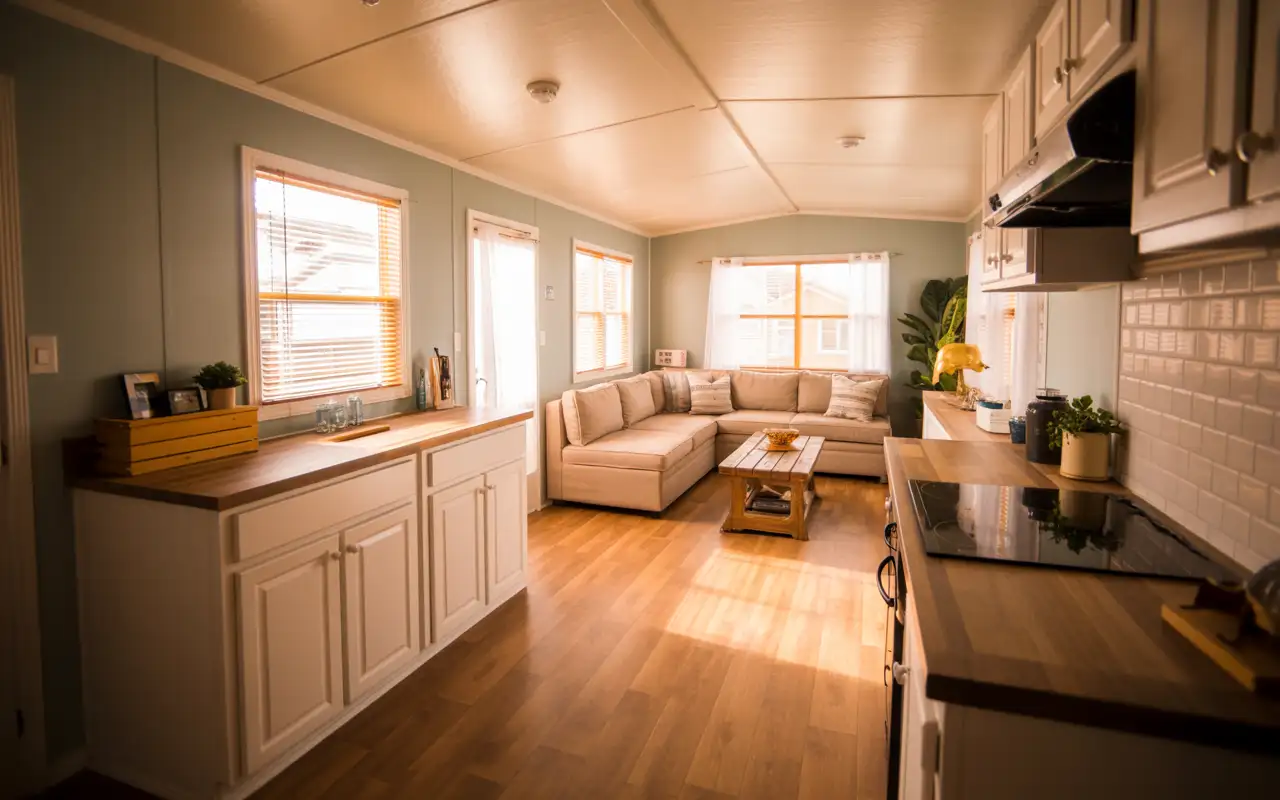If you have just finished giving your bedroom a fresh coat of paint, you are likely eager to move back in. However, the short answer to whether it is safe to sleep in a freshly painted room is: No, you should not. While modern paints are safer than they used to be, the residual fumes can pose health risks, especially during the first 24 to 72 hours. Waiting is a must for your health.
The characteristic “new paint smell” comes from gases that can harm you while you sleep. To protect yourself and your family, you need to understand the chemicals involved and how long it takes for a room to truly be safe for sleeping. This guide gives you the precise answers, backed by expert data, to help you make an informed decision.
Table of Contents
When It Is Safe to Sleep in a Newly Painted Room
Here’s the timeline based on paint type:
- Water-based paints: Wait 24 hours minimum. These paints dry faster and release fewer harmful fumes. With good airflow, you can usually sleep in the room after one full day.
- Oil-based paints: Wait 72 hours or more. These take longer to dry and emit stronger fumes. Don’t rush this timeline, especially if you have respiratory issues.
- Low-VOC or zero-VOC paints: Wait 8-12 hours. These eco-friendly options are much safer. You might be able to sleep in the room the same night if you painted early in the day.
I’ve worked on hundreds of painting projects in San Diego homes, and here’s what I tell homeowners: if you can still smell paint fumes, the room isn’t ready. Your nose is actually a pretty good indicator.
Room size matters too. A small 10×10 bedroom needs more time to air out than a large 15×20 master suite with high ceilings. The paint-to-air ratio makes a real difference.
Testing If Your Room Is Actually Safe

Don’t just guess. Here are three ways to check:
- The smell test: Open the door after being away for 30 minutes. Strong paint smell? Not ready yet.
- Touch test: Gently touch a hidden spot (like behind the door). If it’s tacky or cool to touch, it’s still drying.
- VOC meter: You can buy one for $30-50 on Amazon. Safe levels are below 0.3 ppm (parts per million). Professional painters use these on commercial jobs.
Why You Should Wait Before Sleeping in a Newly Painted Room
When you crack open a paint can, you’re releasing chemicals into your air. These aren’t just annoying, they can genuinely harm your health.
The Environmental Protection Agency warns that paint fumes can affect your central nervous system. Short-term exposure causes immediate symptoms. Long-term exposure (like a professional painter’s face) can lead to serious organ damage.
Here’s what happens when you breathe paint fumes while sleeping: Your body can’t tell you something’s wrong. You won’t wake up from a headache or irritated throat. This extended exposure increases your risk significantly.
What Are Paint Fumes and Why Are They Bad for You?

Paint fumes come from volatile organic compounds (VOCs). These chemicals help paint spread smoothly and dry properly, but they evaporate into your air as the paint dries.
Common VOCs in paint include:
- Formaldehyde (linked to cancer in high doses)
- Benzene (damages blood cells over time)
- Toluene (affects the nervous system)
- Xylene (causes headaches and confusion)
Health effects you might experience:
Immediate symptoms:
- Watery eyes and blurred vision
- Sore throat and coughing
- Headaches that won’t quit
- Dizziness or feeling lightheaded
- Nausea and stomach upset
- Trouble breathing normally
Serious long-term risks:
- Liver and kidney damage
- Central nervous system problems
- Increased asthma attacks
- Potential cancer risk (with repeated exposure)
A primary care physician I spoke with in San Diego explained it this way: “Your lungs absorb whatever’s in the air around you. When you’re sleeping for 8 hours in fresh paint fumes, that’s 8 hours of chemical exposure your body has to process.”
How Long After Painting Can You Sleep in a Room?
The drying time depends on several factors. Here’s what affects how long you need to wait:
Type of Paint Used
- Oil-based paints are the slowest. They contain higher VOC levels and need 3-5 days to fully cure. Professional painters charge more for oil-based work partly because of the longer project timeline.
- Water-based latex paints are your best bet for bedrooms. They dry in 4-6 hours to the touch, but you should still wait 24 hours before sleeping there. These emit 70% fewer VOCs than oil-based options.
- Low-VOC paints cost about $5-10 more per gallon (around $35-45 vs $25-35 for regular paint). Worth it if you need the room ready faster.
- Zero-VOC paints are the premium option at $45-60 per gallon. Brands like Benjamin Moore Natura or Sherwin-Williams Harmony work great for nurseries and bedrooms.
Ventilation and Air Circulation
This is huge. A well-ventilated room dries 50% faster than a closed-up space.
Best ventilation setup:
- Open windows on opposite sides for cross-ventilation
- Place a box fan in one window blowing outward
- Put another fan in the doorway pulling fresh air in
- Keep ceiling fan running if you have one
San Diego climate advantage: Our dry weather helps paint dry faster. In humid places like Florida, the same job takes twice as long. Summer humidity here rarely tops 70%, which is perfect for painting.
Number of Coats Applied
One coat? You’re looking at the minimum wait times I mentioned above.
Two coats? Add 24 hours to your timeline. Each layer needs to fully dry before it’s safe.
Three or more coats (like when covering dark colors)? Plan on waiting an extra 48 hours minimum.
Who’s Sleeping in the Room
Not everyone reacts the same way to paint fumes.
High-risk groups who need extra time:
- Babies and young children: Their lungs are still developing. Wait a full week before letting kids under 5 sleep in a freshly painted room, even with low-VOC paint.
- Pregnant women: The EPA specifically warns against exposure. Some studies link paint fumes to developmental issues. Wait at least 5-7 days, or stay elsewhere entirely.
- People with asthma: Paint fumes trigger attacks. I’ve seen homeowners end up in urgent care from sleeping too soon in a painted room. Wait 4-5 days minimum and consider using an air purifier.
- Older adults: Reduced lung capacity means they’re more sensitive. Add an extra day or two to the standard timeline.
- Pets: Dogs and cats are lower to the ground where fumes settle. Keep them out for at least 3 days.
Factors That Affect Paint Drying Times
Temperature in the Room
Paint dries best between 50-85°F. Too cold? The paint won’t cure properly. Too hot? It dries too fast and might crack.
San Diego’s mild climate (65-75°F year-round) is actually ideal for interior painting. You won’t face the temperature problems that homeowners in extreme climates deal with.
Humidity Levels
High humidity traps VOCs in the air longer. It also slows the drying process significantly.
Use a dehumidifier if your humidity is above 60%. This cuts drying time by 30-40%. You can rent one from Home Depot for about $40/day.
Low humidity (below 40%) is perfect. Paint dries faster and fumes disperse quicker.
Size and Layout of Space
Small rooms concentrate fumes. A 10×10 bedroom has less air volume than a 20×20 master suite. The paint-to-air ratio is much higher in smaller spaces.
Rooms with only one window take longer to air out. You need cross-ventilation for the best results.
High ceilings help. More air volume means fumes dissipate faster.
Protect Yourself After Painting With These Precautions
If you need to get back into your freshly painted room as quickly as possible, you must actively work to remove the fumes. Simply cracking a window may not be enough.
1. Maximize Cross-Ventilation
Do not rely on one window open. Create a strong cross-breeze. Place a box fan facing out of one window (to pull the stale air out) and open a second window on the opposite side of the room (to pull fresh air in). Run this setup for 48 to 72 hours before sleeping in a newly painted room. This action increases the Air Changes Per Hour (ACH), the measurable rate at which the air inside is replaced with outside air.
2. Introduce Active Air Filtration
An air purifier with a HEPA filter for particles combined with a thick layer of Activated Carbon is highly effective at removing paint-related VOCs.
- HEPA filters remove dust and particles.
- Carbon filters absorb gas and chemical molecules, directly addressing the VOC problem. This is the single best tool for how to remove paint smell quickly.
3. Maintain Low Humidity
High humidity slows the drying and curing process, trapping VOCs for longer. Use a dehumidifier in the painted room to keep the humidity level below 50%. This helps both oil based paints and water based paints dry faster.
4. Check the Manufacturer’s Curing Time
Remember: the drying time is when the paint is dry to the touch; the curing time is when the paint film has reached its maximum hardness and has stopped off-gassing. Full curing can take 7 to 14 days, depending on the type of paint. If you can, keep the room vacant for at least the first three days of the curing phase.
Long-Term Off-Gassing Timeline
Here’s something most articles don’t mention: paint continues releasing low levels of VOCs for weeks or even months after it “dries.”
The full timeline:
- Days 1-3: Heavy off-gassing (this is when it’s dangerous)
- Week 1: Moderate off-gassing (smell is mostly gone but chemicals still present)
- Weeks 2-4: Light off-gassing (safe for most people)
- Months 2-6: Minimal off-gassing (paint is fully cured)
This is why zero-VOC paint matters for nurseries. You’re not just worried about the first few nights you want minimal chemical exposure for months to come.
Trust SD Home Remodeling for Safe Interior Painting in San Diego, CA
At San Diego Home Remodeling, we’ve completed over 500 interior painting projects across the San Diego area. We know how important your family’s health is, which is why safety comes first on every job.
Our painting services in San Diego include:
- Exclusive use of low-VOC and zero-VOC paints
- Proper ventilation setup during and after painting
- Flexible scheduling so your home is ready when you need it
- Complete furniture protection and cleanup
- Clear guidance on when rooms are safe to use
We’re a local San Diego company with 23+ years of experience. Our team is licensed, insured, and trained in the latest safe painting practices. We don’t just slap paint on walls, we care about the air quality in your home.
Ready to transform your space safely? Call us at 619 206 7590 or request a free estimate online. We’ll assess your project, recommend the best paint options for your needs, and create a timeline that keeps your family safe. Most bedroom projects are completed in 1-2 days, with rooms ready for use within 24-48 hours.
Final Words
Sleeping in a freshly painted room isn’t worth the risk. Wait at least 24 hours for water-based paints, 72 hours for oil-based paints, and longer if you’re painting a nursery or have vulnerable family members.
The paint smell is your warning system. If you can smell it, you shouldn’t sleep there yet. Use fans, open windows, and air purifiers to speed up the process safely.
Choose low-VOC or zero-VOC paints whenever possible. Yes, they cost a bit more upfront, but you’ll save time and protect your health. That $10 extra per gallon is worth being able to use your room a full day earlier.
If you’re unsure about any part of the process, hire professionals. We see DIY projects go wrong all the time, wrong paint choices, poor ventilation, or people sleeping in rooms too soon. Don’t risk your family’s health trying to save a few bucks.
FAQs: Is It Safe to Sleep in a Freshly Painted Room
Can you sleep in a room the same day you paint it?
Only if you used zero-VOC paint, painted early in the morning (by 8 AM), and kept windows open all day with fans running. Even then, it’s not ideal. Water-based paints need at least 12-16 hours. Oil-based paints? Absolutely not.
How can I tell if paint fumes are still dangerous?
Trusting your nose’s first strong paint smell means high VOC levels. For accuracy, use a VOC meter (under $50 on Amazon). Safe levels are below 0.3 ppm. Also check if the paint feels cool or tacky to touch, which means it’s still drying and releasing fumes.
What happens if I already slept in a newly painted room?
Don’t panic. Get fresh air immediately and monitor for symptoms like headaches, dizziness, or breathing problems. Most people fully recover within 24 hours. If symptoms persist or worsen, contact your doctor. Avoid sleeping there again until the room is properly aired out.
Are low-VOC paints really safer?
Yes, significantly. Regular paint contains 200-300 grams of VOCs per liter. Low-VOC contains less than 50 grams per liter. Zero-VOC contains less than 5 grams per liter. That’s a 95% reduction in harmful chemicals. The difference in air quality is dramatic.
How long should pregnant women wait?
At least one week, regardless of paint type. The EPA specifically warns pregnant women about paint exposure. VOCs can cross the placental barrier. If possible, stay elsewhere entirely during the painting process and for several days after. Always choose zero-VOC paint for nurseries.
Does opening windows really help that much?
Absolutely. A room with windows closed can take 5-7 days to be safe. The same room with windows open and fans running? 1-2 days. Cross-ventilation (windows on opposite walls) is even better. It reduces VOC levels by 70-80% within the first 24 hours.
Can I speed up paint drying with heat?
Yes, but carefully. Keep room temperature between 70-75°F. Space heaters can help in winter, but don’t blast hot air directly at walls. Paint needs to dry evenly. Better option: use a dehumidifier to remove moisture from the air, which speeds drying by 30-40%.
Is it safe for pets to be in a freshly painted room?
No. Pets are more sensitive to paint fumes than humans. Their smaller size and faster breathing rate mean they absorb more VOCs. Keep cats and dogs out for at least 3 days. Birds are extremely sensitive and keep them away for a full week.
What’s the difference between paint drying and curing?
Drying means the surface feels dry to touch (4-8 hours for most paints). Curing means the paint has fully hardened and stopped releasing VOCs (2-4 weeks). You can sleep in a room after it’s dry, but optimal air quality comes after it’s fully cured.
Should I use an air purifier after painting?
Yes, it helps a lot. Get one with a HEPA filter AND activated carbon filter. The carbon specifically removes VOCs. Run it continuously for 48-72 hours. It can reduce VOC levels by 60-80%. Costs $100-200 but totally worth it for faster, safer results.







